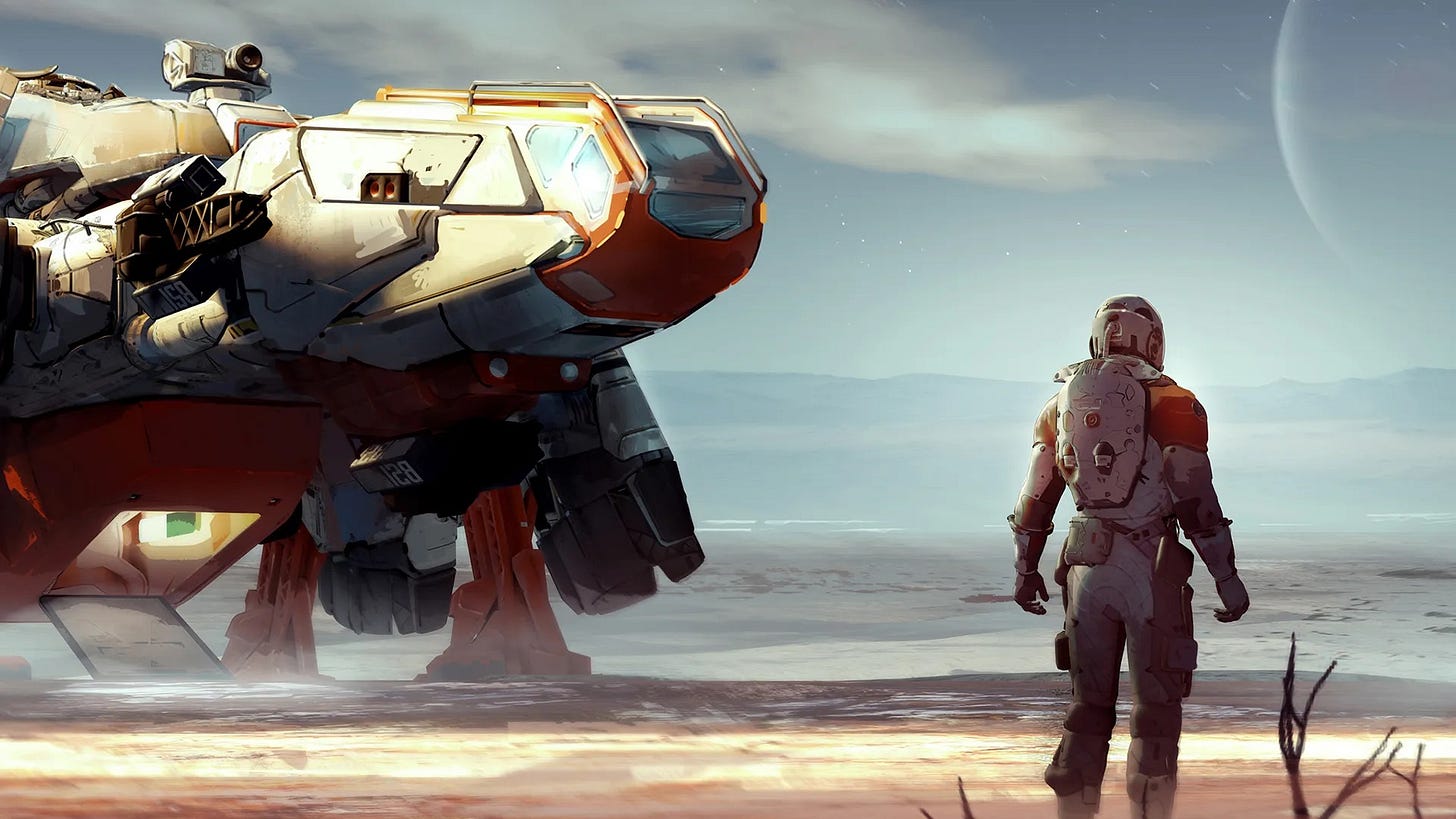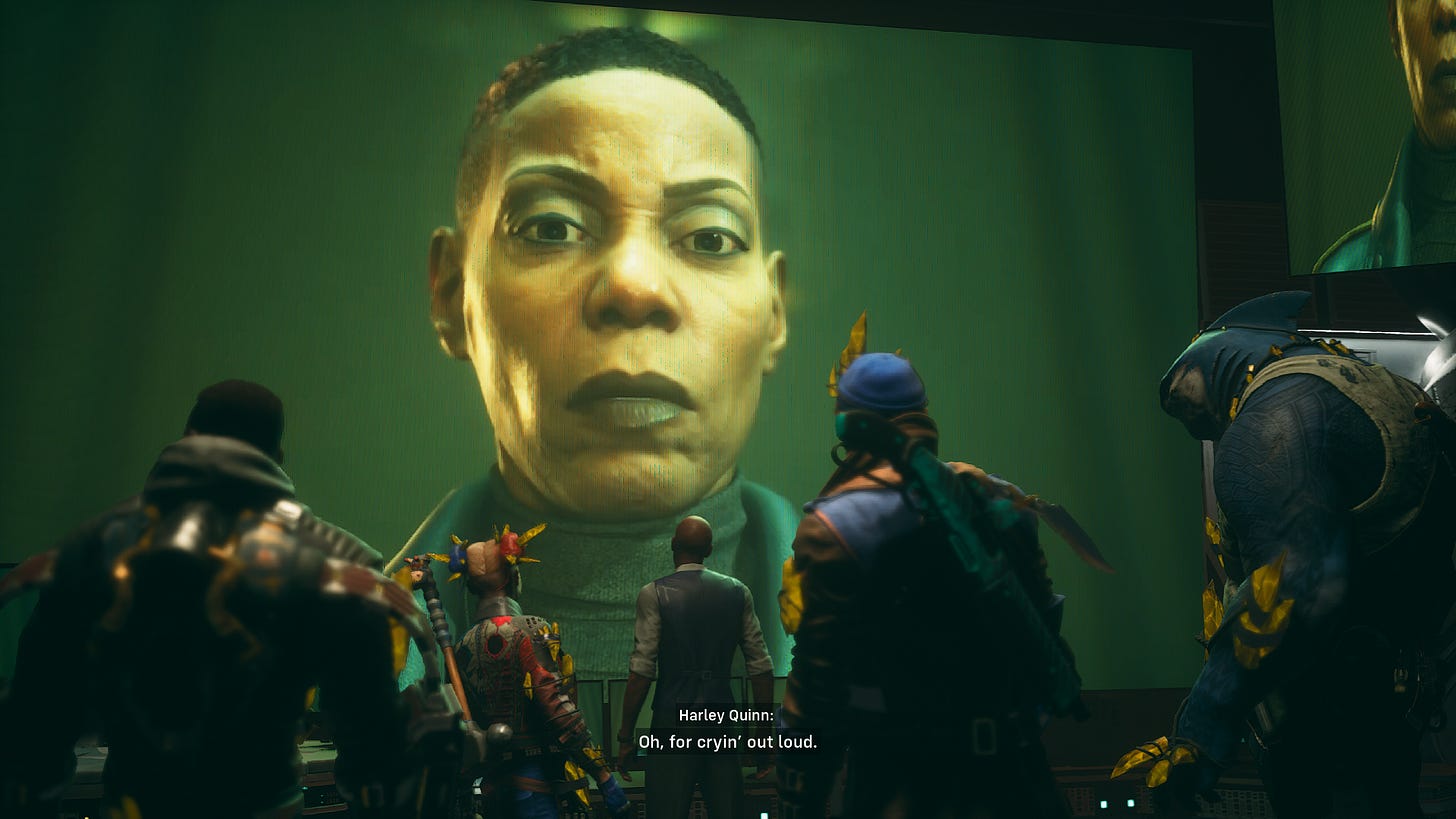Microsoft might bring some of its biggest Xbox Series X/S exclusives to the PlayStation 5. It's great news for players and a potentially seismic shift for the console market that has longtime Xbox fans spiraling in disbelief like they just watched their hometown football team get traded to their high school bully who's now rich and lives on the other side of the country and is paying Hideo Kojima to make a spiritual successor to Metal Gear Solid. When the news broke Xbox content creators pulled over in their cars to process the implications or held emergency streams like Skynet had just taken over Microsoft.
XboxEra reported on Sunday night that Microsoft is planning to launch sci-fi RPG Starfield on Sony's platform after its Shattered Space expansion arrives later this year. The Verge reported soon after that the tech giant is currently weighing whether to bring its upcoming Indiana Jones action adventure to PS5 just months after it debuts on Xbox before the end of 2024. This comes less than a month after reports that Sea of Thieves and Hi-Fi Rush might also drop their console exclusivity. A datamine of the latter recently revealed PlayStation and Nintendo-themed in-game t-shirts, all but confirming the critically-acclaimed 2023 rhythm beat 'em up is going multiplatform.
The business case for doing so is clear enough. Microsoft already extracted the value from having these games be exclusive, the argument goes, and bringing them to more platforms now will increase sales and, in the case of Sea of Thieves, expand the microtransaction-buying multiplayer user-base. Perhaps Starfield didn't sell as well as Microsoft had hoped and porting it to a console platform with double the install base will dramatically increase its overall profitability. As Microsoft focuses on cloud gaming and subscription bundles, eroding exclusivity helps bring more players into the Xbox ecosystem who have already made clear they aren't interested in buying an Xbox Series X/S regardless.
At the same time, it seems absurd to treat this shift as a necessary and inescapable evolution of Microsoft's Game Pass strategy rather than backpedaling in the face of higher interest rates and slower-than-expected Xbox sales. The company did a lot of hemming and hawing about making Starfield exclusive, sending then head of Bethesda marketing, Pete Hines, out to apologize to players for the move after months of cagey non-answers. We now know from FTC trial materials and leaks that Hines was upset when he learned Activision Blizzard would similarly be forced to cut its biggest franchises off from PlayStation players. This apparent inconsistency was also a big point of attack by regulators when trying to stop the ABK acquisition, but Hines dutifully swore in front of the judge that games like Indiana Jones, originally planned as multiplatform, simply went exclusive because it streamlined development. He left the company a few months later.
We have an unusual amount of internal context around Microsoft's Xbox decision making due to that trial, and it all seems to indicate that the company was very invested in Xbox as a hardware platform when the latest generation of consoles launched. Now Microsoft Gaming CEO Phil Spencer was very bullish on the Xbox Series X/S hardware and its 2020 launch vis-a-vis PS5. We also know that a decision was made to cannibalize a certain amount of new console units during the launch window when supply was scarce to expand cloud gaming capacity. It was also clear that Microsoft wanted the Bethesda acquisition to feel like a win for its longtime fans who hadn't historically had access to the same steady flow of Game of the Year-contender exclusives as PlayStation owners. It wasn't until 2023, under scrutiny from the FTC over antitrust concerns, that Microsoft began downplaying the significance of exclusives and its ambitions to grow Xbox as a platform with a console at the center of it.
While bringing more games to more people is an obvious win, diehard Xbox fans are understandably freaking out. Wouldn't you also feel like a sucker if you spent $500 on an Xbox Series X/S because Microsoft bought Bethesda and later confirmed its long-awaited "Skyrim in space" blockbuster would become exclusive, only to reverse course a year after the game came out? Microsoft has spent years cultivating one of the most, ah, intense gaming fanbases around, which was convinced that any year now Xbox would catch its second wind and rekindle its momentum from the Xbox 360 days. How does it now tell them that none of that is important and actually it's all about demonstrating top line revenue growth to perennially skittish shareholders? What does Xbox even mean once the garden’s walls come down?
It’s important to understand the role Starfield was supposed to play in the Xbox ecosystem. At least in the minds of some super fans it was supposed to bring “balance to the force” in terms of how lopsided first-party output had been between Microsoft and Sony heading into the latest console generation. Instead Starfield ended up feeling like the best and worst of every Bethesda RPG design quirk from the last 10 years.
It’s also it's very possible that this pivot will mostly apply to blockbuster Bethesda games, which have historically been multiplatform. There are already rumors flying that Hellblade 2 and even older Halo games could be coming to PS5, which would certainly represent the end of an era for console gaming. Or, limiting exclusivity will apply to a much narrower set of games, mainly to appease talent at Bethesda who may not want to stay and work at a company that's now reaching half or less of its potential audience.
I do think it's no small thing to walk away from a platform like Xbox, which is the one marketplace Microsoft owns where it gets a 30% cut of every transaction. If your install base is lagging 10-15 million units behind what you hoped it might be at this point, it might make short terms sense to collect a return on all of the expensive games you acquired by releasing them on competitors' platforms, but it has big ramifications down the road.
No gaming platform has ever competed, let alone survived, without exclusive software. That was Jade Raymond's message to Google Stadia developers when it axed its internal studios. I stand by what I wrote last year: nothing Xbox does matters if the games aren’t good, and porting them to PlayStation will not suddenly turn Starfield or Halo Infinite into flawless games. And you have to wonder what Sony will do with PlayStation, from pricing to investment in content, if and when its only major competitor in the high-end console gaming space effectively drops out.
Pining for the PS2 days
A survey of dubious origins recently made the rounds suggesting hundreds of studios are working on live service games of one form or another (though by the definition of the survey, live service games would include things like Baldur’s Gate 3). Rollerdrome lead programmer Andrew Fray responded with what he called a “PS2 manifesto” calling for more focused games without upgrade trees that let you finish them quickly and move on. The sentiment appeared to meet with universal support. Some indie developers (Thirsty Suitors, Bugsnax) pointed out they’re basically already doing this. Though it could just be a generational gap. Players born after the PS2 seem perfectly content to grind through Fortnite and all of its competitors.
Suicide Squad: is it so over or so back?
My time with Suicide Squad is perfectly summed up in the It's So Over / We're So Back chart meme. The more I play, the more I love some things and hate others. The traversal and combat look and feel great. The loot system and mission design feel very bad. There are some really cool story beats and also a lot of nonsense that has absolutely zero weight to it. And yet despite everything, I find myself making time to play every night before bed no matter how late it is or how much I’ll hate myself in the morning when the kids wake up at the crack of dawn.
One thing that becomes unmistakably clear upon finishing Suicide Squad is that it is absolutely, unequivocally, 100% a live service game. I’m not just saying that because much of the content is cookie-cutter and meant to be repeated ad nauseum, or because there’s already a four season post-launch content roadmap. I’m saying that because its baked into the entire narrative setup for the game’s non-ending.
Yet Rocksteady has been running from that label, including in interviews up until launch, even as publisher Warner Bros. Games was publicly touting its big new lucrative games as a service push. Suicide Squad was pitched as a content-complete single-player campaign that you can also play online with friends with a robust end-game for anyone who wanted to hang around and keep playing. It is in fact very much the reverse of that: a seasonal live service game that uses a story-based campaign to funnel players into the rest of the loot shooter treadmill.
So I think it’s completely fair to wonder about how well the game is actually selling, and how many people are actually playing, since the real promise of a live service game is its post-launch trajectory rather than the week or two you spend fiddling with it right after it comes out. The numbers so far seem wildly disparate. Initial Steam concurrent player counts peaked around 12,500, below the single-player RPG remake Persona 3 Reload, while Suicide Squad appears to be in the top three most-played games on both PS5 and Xbox Series X/S right now. User reviews are also a lot more positive than the critical reception, with 80% positive and up across Steam and console compared to around 60 on Metacritic.
More links:
Final Fantasy creator Hironobu Sakaguchi reached out to the director of Final Fantasy XV to complain about a bug in one of the game’s pre-release trailers. A new interview by 4gamer has lots of other fascinating tidbits as well).
Final Fantasy XIV will require an Xbox Live subscription on Xbox (now called Game Pass Core) unlike on PlayStation where no paid PS Plus subscription is required.
Cult PS1 RPG Linda Cubed finally has an English fan translation. Critic Christa Lee calls it the “most important post-Mother RPG ever made.”
Hacker Gary Bowser who owes Nintendo $14 million following a conviction over a Switch piracy crime bust says he paid the Mario maker $25 a month while in jail which he earned from counseling inmates at risk of suicide.
A fantastic piece chronicling the “innumerable absurdities” in Kingdom Hearts 3.
A deep-dive comparing Palworld to Ark: Survival Evolved and looking at everything the Pokémon with guns survival crafting sim learned from one of the genre’s longest running stalwarts.
Players of Enshrouded, another new hit survival crafting game on Steam, are building elaborate underground hideouts to rival Lord of the Rings’ Mines of Moria.
Last week’s PlayStation State of Play may have been the best one Sony’s ever done. An extended trailer for Death Stranding 2 stole the show, but my favorite game from the showcase was Stellar Blade, a PS5 sci-fi action game coming in April from a brand new South Korean studio called Shift Up. It sounds like its chasing those Nier Automota vibes.
This year’s Call of Duty appears to be called Black Ops Gulf War and is reportedly trying to go open world, again.
Someone put Elden Ring’s maps into Armored Core VI. I hope you’re ready for another road trip to the The Lands Between. This time while duel-wielding Gatling guns.









